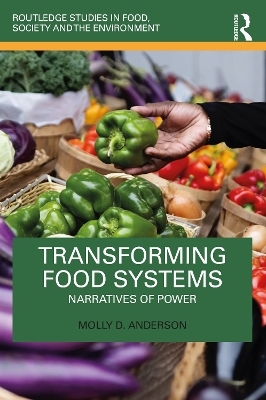
Transforming Food Systems
Routledge (Verlag)
978-1-032-19667-1 (ISBN)
The book approaches food system transformation through narratives, or the stories we tell ourselves and others about how things work. Narratives are closely connected with theories of change, although food system actors frequently lack explicit theories of change. Using political economy and systems approaches to analyze food system transformation, the author focuses on how power in food systems manifests, and how this affects whom can obtain healthy and culturally appropriate food on a reliable basis. Among the narratives covered are agroecology, food sovereignty and technological innovation. The book draws on interviews and recorded speeches by a broad range of stakeholders, including international policymakers, philanthropists, academics and researchers, workers in the food and agricultural industries and activists working for NGOs and social movements. In doing so, it presents contrasting narratives and their implicit or explicit theories of change. This approach is vitally important as decisions made by policymakers over the next few years, based on competing narratives, will have a major influence on who will eat what, how food will be produced, and who will have a voice is shaping food systems. The overarching contribution of this book is to point toward the most promising pathways for achieving sustainable food systems and refute pathways that show little hope of achieving a more sustainable future.
This book will be of great interest to students, scholars and policymakers interested in creating a sustainable food system which will ensure a food secure, socially just and environmentally sustainable future.
Molly D. Anderson is William R. Kenan, Jr. Professor of Food Studies at Middlebury Collegy, USA. She is an Honorary Research Fellow in the Centre for Agroecology, Water and Resilience at Coventry University, UK, and a member of International Panel of Experts on Sustainable Food Systems. She is co-editor of Food Insecurity: A Matter of Justice, Sovereignty and Survival (Routledge, 2020).
Section 1. The Need for Transformation
Chapter 1. Why This Book?
Chapter 2. Do We Really Agree on Food System Problems and Goals?
Section 2. Competing Food System Narratives
Chapter 3. Significance of Narratives and Their Connections with Theories of Change
Chapter 4. The Value of Food: Commodity or Commons
Chapter 5. Mapping Power Flows in Food Systems
Section 3. Narratives of Transformation: What and Who Will Drive Change?
Chapter 6. What Drives Food System Transformation toward Regeneration? Narratives that Do Not Require Structural Transformation
Chapter 7. What Drives Food System Transformation toward Regeneration with Structural Changes in Power?
Chapter 8. Who Will Lead Transformation?
Section 4. Case Studies: International and Local
Chapter 9. International Forums: The CFS and the UNFSS
Chapter 10. Grassroots Initiatives to De-commodify Food Systems
Section 5. Can Food System Narratives Be Melded Together?
Chapter 11. Future Food System Narratives
| Erscheinungsdatum | 10.07.2024 |
|---|---|
| Reihe/Serie | Routledge Studies in Food, Society and the Environment |
| Zusatzinfo | 10 Line drawings, black and white; 10 Illustrations, black and white |
| Verlagsort | London |
| Sprache | englisch |
| Maße | 156 x 234 mm |
| Gewicht | 453 g |
| Themenwelt | Sozialwissenschaften ► Soziologie ► Spezielle Soziologien |
| Weitere Fachgebiete ► Land- / Forstwirtschaft / Fischerei | |
| ISBN-10 | 1-032-19667-X / 103219667X |
| ISBN-13 | 978-1-032-19667-1 / 9781032196671 |
| Zustand | Neuware |
| Informationen gemäß Produktsicherheitsverordnung (GPSR) | |
| Haben Sie eine Frage zum Produkt? |
aus dem Bereich


